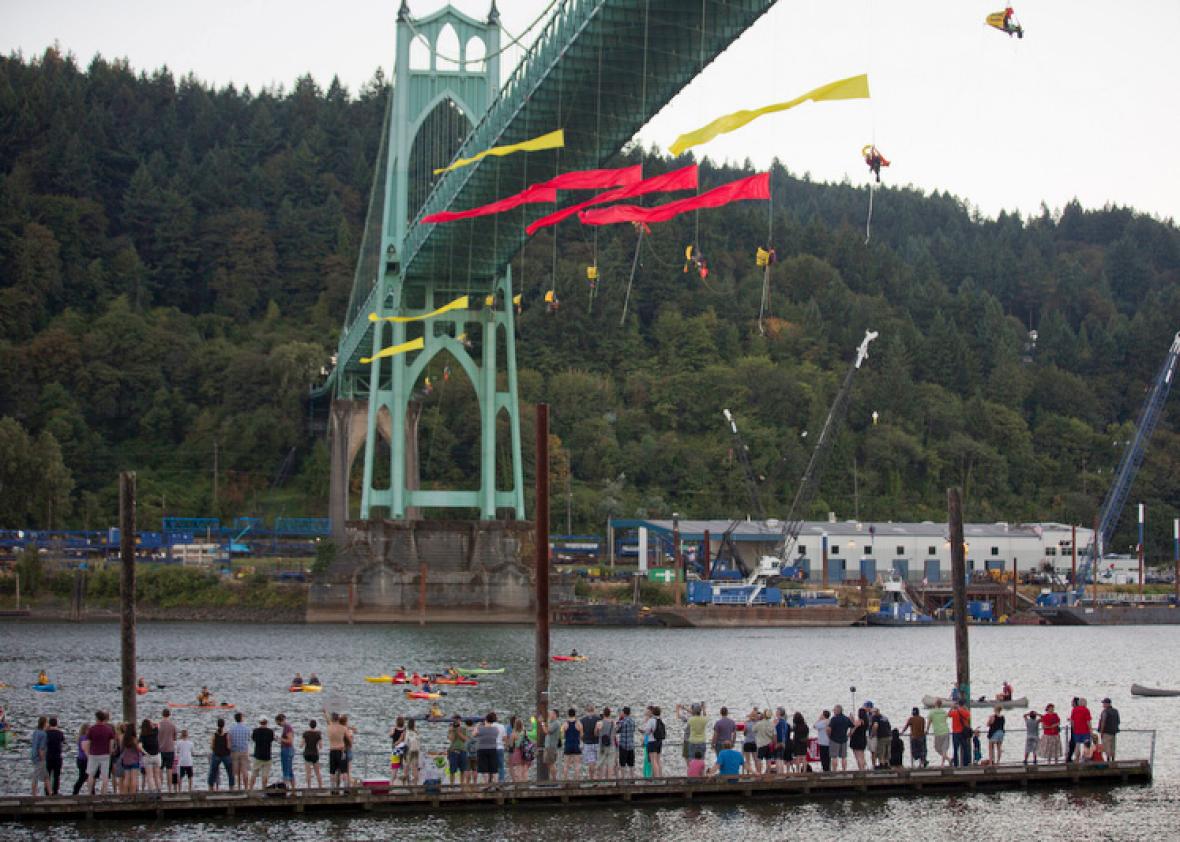Call it kayaktivism’s biggest victory to date: On Wednesday morning, a group of 13 climbers associated with Greenpeace rappelled from the St. John’s Bridge in Portland, Oregon, intending to block a Shell icebreaker from returning to the Arctic. On Thursday, in hour 29 of the climbers’ protest on the bridge, Shell’s ship, escorted by the U.S. Coast Guard, was forced to return to port.
A Periscope livestream, shot by activist Kristina Flores, shows the Fennica turning around in the Willamette River on Thursday morning to cheers from the protesters. It’s unclear what Shell’s plans are now for the MSV Fennica—it’s been docked in Portland, undergoing repairs—and a ship-tracking website showed no pending itinerary. During her broadcast, Flores said, “We have the staying power to be here as long as necessary.”
Flores and her fellow protesters are opposed to the ship’s return to the Arctic, and are attempting to slow Shell’s resumption of oil drilling there, where it has a checkered history. A January study by a team of British scientists showed that continued oil exploration in the Arctic is inconsistent with efforts to limit global warming to so-called “safe” levels. The campaigners are also frustrated with the Obama administration for recently approving Shell’s Arctic oil drilling, which has been widely criticized as being inconsistent with his overall plan to limit U.S. carbon emissions. In recent days, Portland has become the focal point of this frustration because of the Fennica, a Finnish-flagged support ship whose presence is required at Shell’s controversial drilling site in the Chukchi Sea in the Alaskan Arctic. The Fennica carries a capping stack, a critical piece of safety equipment designed to prevent oil leaks in case of a well blowout.
On Wednesday, I exchanged tweets with one of the climbers, Dan Cannon, who wrote of the experience: “This is bigger than Greenpeace and/or the climbers - the movement to protect the Arctic is vast.” In a statement, Dan Ritzman, the director of the Sierra Club’s Arctic campaign said: “These brave activists have done what hundreds of thousands of Americans have called on President Obama to do: Stop Shell from drilling in the Arctic.”
A similar action led by activists in brightly colored kayaks last month in Seattle failed after the Coast Guard pulled protesters out of the way. A spokesperson for Shell, Megan Baldino, said in a statement about this most recent protest, “We respect the rights of individuals and groups to express their opinions: All we ask is that they do so within the confines of the law and maintain safety as their first priority.”
During its quarterly earnings report on Thursday, Shell announced it is cutting 6,500 jobs and plans to reduce capital investment by $7 billion amid a sharp drop in profits, which it blamed on multi-year low oil prices it says “could last for several years.” As Slate’s Jordan Weissmann has pointed out, continued low oil prices particularly affect oil companies’ profitability in the Arctic, the most expensive place to drill for oil.
In an interview with a New Hampshire television station on Tuesday, Democratic presidential candidate Hillary Clinton appeared to break with the Obama administration in her first substantive comments on Arctic drilling. “I have doubts about whether we should continue drilling in the Arctic,” Clinton said. “I don’t think it is a necessary part of our overall clean energy climate change agenda.”
Update, 4:45 pm.: The Associated Press reports a federal judge in Alaska ruled on Thursday that the Greenpeace activists are in contempt of an earlier ruling preventing protests too close to Shell’s vessels. The judge imposed an escalating fine on Greenpeace, payable to Shell, at $2,500 per hour—rising to $10,000 per hour if the protest is still continuing on Sunday.
Update, 8:55 pm.: After more than 40 hours, Shell’s Fennica has departed Portland. The Oregonian reports an eventful afternoon which involved an official closure of a section of the Willamette River and nearly continuous confrontations between protesting kayakers and the Coast Guard, including the Coast Guard and local authorities forcibly removing kaykers from the river using hooked poles. After removing three of the climbers from the bridge, authorities were eventually able to clear a wide enough path through the river for the Fennica to pass.
